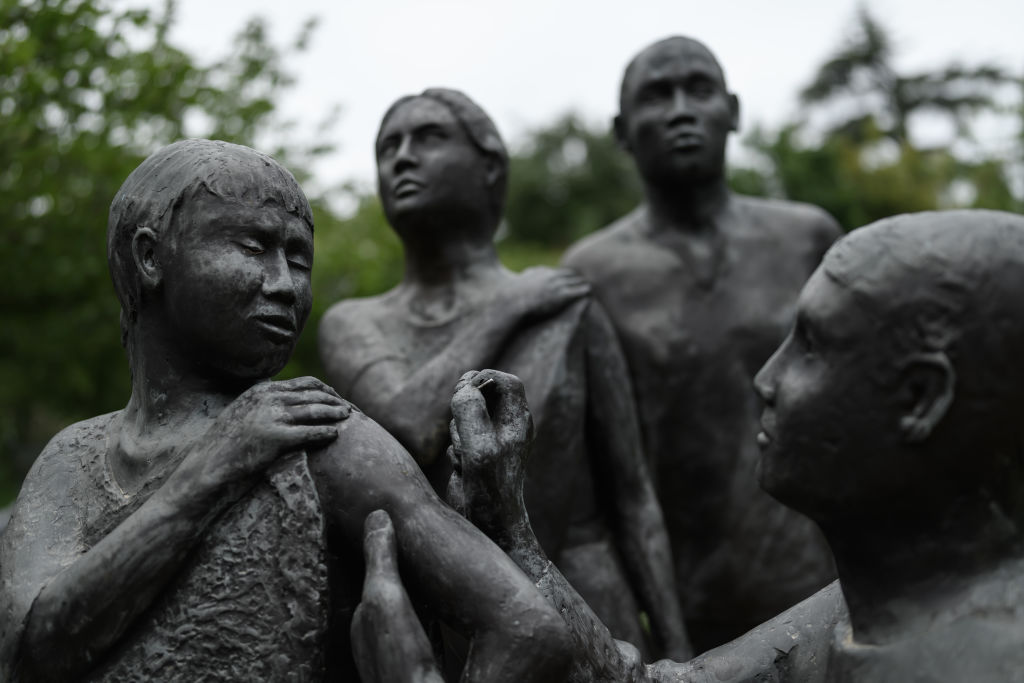WHO will vote on proposal to guarantee COVID-19 vaccines are available, affordable for everyone


A free daily email with the biggest news stories of the day – and the best features from TheWeek.com
You are now subscribed
Your newsletter sign-up was successful
"There are currently no known vaccines for COVID-19 but fighting over those that might be produced has begun," VOA News reports. French drugmaker Sanofi was widely criticized Thursday after its CEO suggested to Bloomberg News that the U.S. would get first crack at its COVID-19 vaccine — one of about 100 under development worldwide — "because it's invested in taking the risk." French President Emmanuel Macron said a vaccine shouldn't be subject to market forces.
The World Health Organization's governing body, the World Health Assembly, is scheduled to vote next week on a resolution calling for "the universal, timely, and equitable access to and fair distribution of all quality, safe, efficacious, and affordable essential health technologies and products," Politico reports. That means, essentially, that any vaccine developed in the coming months would have no effective patent, allowing national governments to produce and distribute it without a license.
A group of 140 current and former leaders — including South African President Cyril Ramaphosa, Pakistani Prime Minister Imran Khan, and former British Prime Minister Gordon Brown — signed an open letter Wednesday pushing the World Health Assembly to "rally behind a people's vaccine against this disease." The world can't "leave this massive and moral task to market forces," the signatories write, and wealthy countries need to understand that "our world will only be safer once everyone can benefit from the science and access a vaccine" in "all countries, free of charge."
The Week
Escape your echo chamber. Get the facts behind the news, plus analysis from multiple perspectives.

Sign up for The Week's Free Newsletters
From our morning news briefing to a weekly Good News Newsletter, get the best of The Week delivered directly to your inbox.
From our morning news briefing to a weekly Good News Newsletter, get the best of The Week delivered directly to your inbox.
Hedge funds and private equity firms, which bet on winners in the market, are already leery of putting their money into COVID-19 vaccines, despite a "huge" potential market, The Wall Street Journal reports. "By some measures, Chinese companies and a group at Oxford University are in the lead. Some companies say they will distribute a vaccine they develop at cost, potentially reducing profits for others."
"Pandemics can't be handled domestically because they are global in nature," Ryan Heath writes at Politico. "Delivering $8 trillion for domestic stimulus but only $8 billion for vaccine distribution is a defining failure for global solidarity."
A free daily email with the biggest news stories of the day – and the best features from TheWeek.com
Peter has worked as a news and culture writer and editor at The Week since the site's launch in 2008. He covers politics, world affairs, religion and cultural currents. His journalism career began as a copy editor at a financial newswire and has included editorial positions at The New York Times Magazine, Facts on File, and Oregon State University.
-
 How the FCC’s ‘equal time’ rule works
How the FCC’s ‘equal time’ rule worksIn the Spotlight The law is at the heart of the Colbert-CBS conflict
-
 What is the endgame in the DHS shutdown?
What is the endgame in the DHS shutdown?Today’s Big Question Democrats want to rein in ICE’s immigration crackdown
-
 ‘Poor time management isn’t just an inconvenience’
‘Poor time management isn’t just an inconvenience’Instant Opinion Opinion, comment and editorials of the day
-
 TikTok secures deal to remain in US
TikTok secures deal to remain in USSpeed Read ByteDance will form a US version of the popular video-sharing platform
-
 Unemployment rate ticks up amid fall job losses
Unemployment rate ticks up amid fall job lossesSpeed Read Data released by the Commerce Department indicates ‘one of the weakest American labor markets in years’
-
 US mints final penny after 232-year run
US mints final penny after 232-year runSpeed Read Production of the one-cent coin has ended
-
 Warner Bros. explores sale amid Paramount bids
Warner Bros. explores sale amid Paramount bidsSpeed Read The media giant, home to HBO and DC Studios, has received interest from multiple buying parties
-
 Gold tops $4K per ounce, signaling financial unease
Gold tops $4K per ounce, signaling financial uneaseSpeed Read Investors are worried about President Donald Trump’s trade war
-
 Electronic Arts to go private in record $55B deal
Electronic Arts to go private in record $55B dealspeed read The video game giant is behind ‘The Sims’ and ‘Madden NFL’
-
 New York court tosses Trump's $500M fraud fine
New York court tosses Trump's $500M fraud fineSpeed Read A divided appeals court threw out a hefty penalty against President Trump for fraudulently inflating his wealth
-
 Trump said to seek government stake in Intel
Trump said to seek government stake in IntelSpeed Read The president and Intel CEO Lip-Bu Tan reportedly discussed the proposal at a recent meeting
